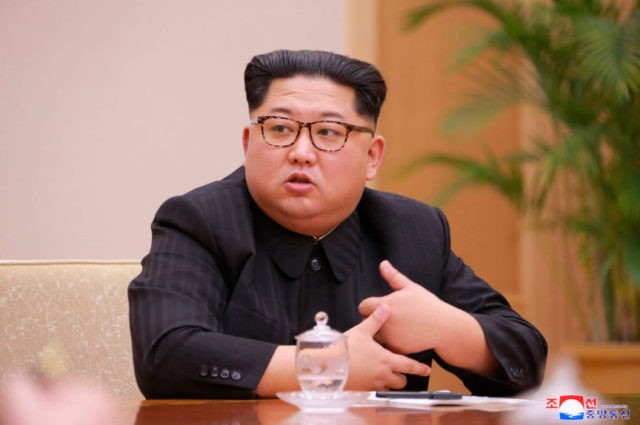North Korean dictator Kim Jong-un mentioned “the prospect of the DPRK-U.S. dialogue” during a high-level meeting of the communist Korean Workers’ Party on Monday, state-controlled media reported over a month after South Korean officials announced that President Donald Trump had accepted an invitation to meet Kim in person.
The Korean Central News Agency’s (KCNA) dispatch on Kim’s remarks represents the first time that North Koreans have been informed of a potential dialogue between North Korea and the United States since those in the free world were notified of Kim’s outreach to Washington.
According to the South Korean outlet Yonhap, citing KCNA, Kim gave the Political Bureau of the Central Committee of the Korean Workers’ Party a “profound analysis and appraisal” of the current relations between North Korea and both South Korea and the United States.
“He made a profound analysis and appraisal of the orientation of the development of the north-south relations at present and the prospect of the DPRK-U.S. dialogue,” KCNA reported, adding that Kim “set forth the WPK’s future policy of international relations and how to respond to them,” Yonhap adds.
The communist outlet reportedly did not provide any further details, including the claim by South Korean officials that Kim was the one to request an in-person meeting with Trump. The details also did not note that a timetable exists in the United States for such a meeting. While the White House claimed the meeting would occur by the end of March, President Trump himself floated the possibility of an early June date for the occasion. Time and place for such a meeting, key issues to negotiate between the two sides, have yet to be finalized.
Korea’s Joongang Ilbo reports that Kim did mention the time and date for his rendezvous with South Korean President Moon Jae-in, scheduled to occur on April 27 on the South Korean side of the border town of Panmunjom. “North Korean media has largely refrained from mentioning the South-North summit, as opposed to South Korean media, which has been going to town with related stories,” Joongang reports. South Korean officials told the newspaper that the relative lack of detail in the remarks on dialogue with the United States was likely intended to avoid boxing Kim into any promises with his own party leadership.
In addition to the KCNA report, state television reportedly aired footage of Kim presiding over the Workers’ Party meeting.
President Trump confirmed that plans for a meeting with Kim were still in process on Monday. “We’ve been in touch with North Korea—we’ll be meeting with them sometime in May or early June,” Trump told reporters. “I think there’ll be great respect paid by both parties, and hopefully we’ll be able to make a deal on the de-nuking of North Korea. They’ve said so; we’ve said so. Hopefully, it will be a relationship that’s much different than it’s been for many, many years.”
Trump described the upcoming meeting as “a very exciting thing for the world.”
White House officials confirmed last week that North Korean officials had privately agreed to discuss the denuclearization of the Korean peninsula, which many media outlets interpreted as negotiations on eliminating North Korea’s illegal nuclear weapons program. Following a dinner in Pyongyang hosted by Kim Jong-un for high-level South Korean envoys, those present at the dinner claimed that Kim had declared denuclearization the “dying wish” of his father, dictator Kim Jong-il.
There has yet to be confirmation that the United States, South Korea, and North Korea are all using the word “denuclearization” to mean the same thing. As the Washington Post notes, there is a high chance that Pyongyang’s interpretation of denuclearization of the Korean peninsula would only include the removal of American nuclear assets from the South and Japan – assets largely in place to protect from a rogue North Korean nuclear attack.
Commentary in North Korean state print media has not reduced its belligerence towards the West since the March announcement of a Kim-Trump summit. In a column last week, the state newspaper Rodong Sinmun declared that “the imperialists,” by which it largely means the United States and the free world, were waging a “hideous reactionary offensive to stamp out the popular masses’ consciousness of independence and undermine their faith in socialism” through “ideological and cultural poisoning.”
“It is important to set up double and treble mosquito nets in all fields of social life and resolutely reject the imperialist idea and culture,” the propaganda outlet advised.

COMMENTS
Please let us know if you're having issues with commenting.